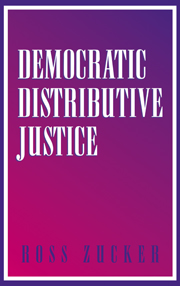Book contents
- Frontmatter
- Contents
- Acknowledgments
- 1 Democracy and Economic Justice
- Part I Unequal Property and Individualism in Liberal Theory
- 2 The Underlying Logic of Liberal Property Theory
- 3 Unequal Property and Its Premise in Locke's Theory
- 4 Unequal Property and Individualism, Kant to Rawls
- Part II Egalitarian Property and Justice as Dueness
- Part III Egalitarian Property and the Ethics of Economic Community
- Part IV Democracy and Economic Justice
- Conclusions
- References
- Index
4 - Unequal Property and Individualism, Kant to Rawls
Published online by Cambridge University Press: 02 December 2009
- Frontmatter
- Contents
- Acknowledgments
- 1 Democracy and Economic Justice
- Part I Unequal Property and Individualism in Liberal Theory
- 2 The Underlying Logic of Liberal Property Theory
- 3 Unequal Property and Its Premise in Locke's Theory
- 4 Unequal Property and Individualism, Kant to Rawls
- Part II Egalitarian Property and Justice as Dueness
- Part III Egalitarian Property and the Ethics of Economic Community
- Part IV Democracy and Economic Justice
- Conclusions
- References
- Index
Summary
Many late eighteenth- through twentieth-century liberal theorists are found to be social theorists, not just adherents of individualism, by commentators. If such an interpretation is intended to apply to liberal theories about the distribution of property, it would seem that commentators have not looked at the premises that guide those theories' conclusions about relative distribution.
KANT'S THEORY OF PROPERTY
For most seventeenth-century political theorists, the concept of the self-determined person, an individual largely formed independently of others, legitimates the “right” to unequal property distribution. Does this concept continue to dominate in the next important phase of liberal thought on property and distribution, the eighteenth- and early nineteenth-century metaphysical school of jurisprudence launched by Kant, particularly in The Metaphysical Elements of Justice (1797)? Or does it give way to a social concept of the person – that is, a concept of the person as self-determined only insofar as he or she is constituted by and within a system of individuals?
Private Right
The theory of property Kant wants to construct would explain how something can belong objectively, universally, and truly to “me,” the subjective individual. For Kant, something is not simply mine because I think it is, but also because other individuals choose the institution of property, which then reflects the free will of others. If they do choose it, then the external thing can be regarded as mine by the social order – that is, my ownership can gain social recognition.
- Type
- Chapter
- Information
- Democratic Distributive Justice , pp. 56 - 82Publisher: Cambridge University PressPrint publication year: 2000



